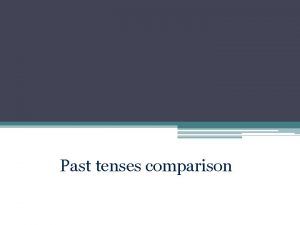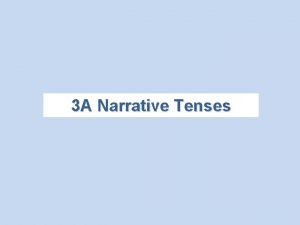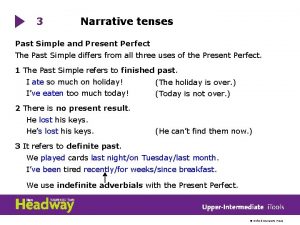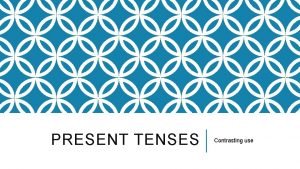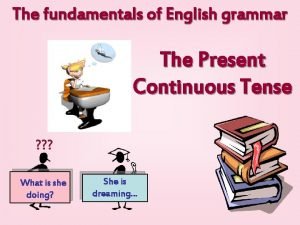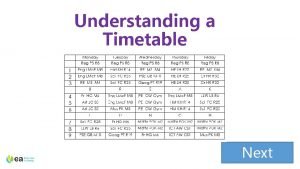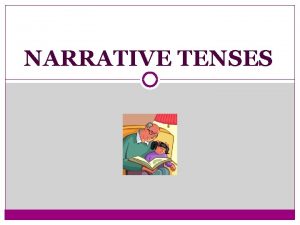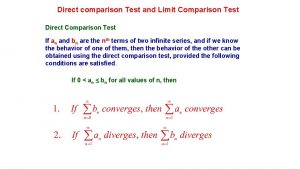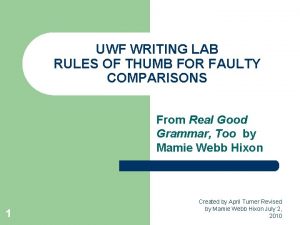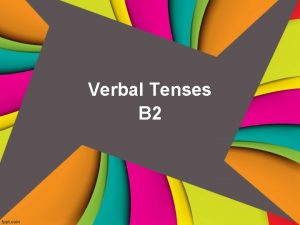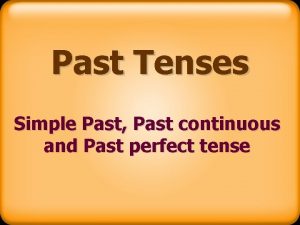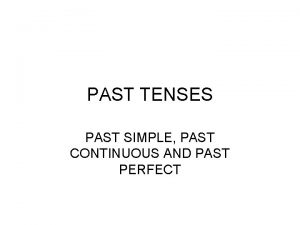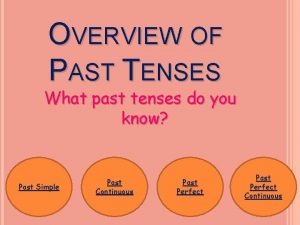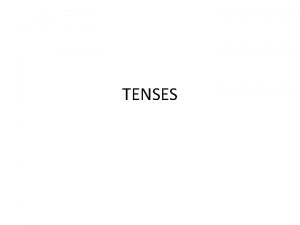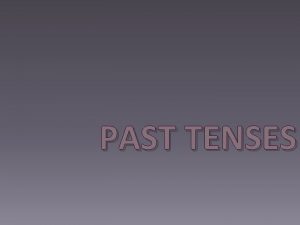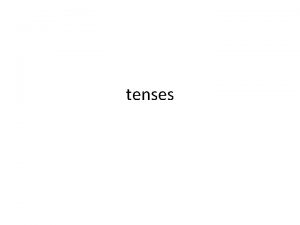Past tenses comparison Identify the past tenses Grammar











- Slides: 11

Past tenses comparison

Identify the past tenses Grammar tense A. Past Simple B. Past Continuous C. Past Perfect When I arrived, . . 1. they were talking about me. 2. they had talked about me. 3. they talked about me.

Past tenses - Use • Action 1: I arrived. • Action 2: They talked about me. Simple Past Action 2 occurring right after action 1. (dej prebieha jeden za druhým) • When I arrived, they talked about me. (First, I arrived. Then they started talking about me. )

Past tenses - Use • Action 1: I arrived. • Action 2: They talked about me. • Past Continuous • Action 2 continuing at the same time as action 1. • Druhý dej prebieha POČAS prvého, naraz) • When I arrived, they were talking about me. . (They started talking about me before I arrived. When I arrived, they were still talking about me. )

Past tenses - Use • Action 1: I arrived. • Action 2: They talked about me. Past Perfect • Action 2 occurring before action 1. • (druhý dej prebiehal už pred prvým dejom) • When I arrived, they had talked about me. UŽ ! • (They started and finished talking about me before I arrived. I didn’t see them talking about me. )

Past Simple – questions/negatives • Questions – Did you have a good time? • Negatives – I didn´t go there. • Past tense of modals • MUST - had to ( I had to get up earlier yesterday) • Did you have to get up. . ? • CAN – could / was, were able to (We could sleep longer on Sunday. /permission) He could speak when he was one year old. /Ability He was able to repair his car. (managed to do )

Past Continuos • Questions – What were you doing? Was he going. . ? • Negatives – I wasn´t waiting for him. . . • They weren´t listening to him. . .

Past Perfect Constists of HAD + past particple • The film had started when I arrived. • She had written the letter before I saw her. • Questions: • Had you done it before you went there? • Negatives: • It was my first job. I hadn´t worked before.

Past Simple + Past Continuous • Typical Conjuctions: 1. WHEN – after both tenses (simple, continuous)can follow • When I saw her, she was doing her homework. • When she was going home, she met Tom. 2. WHILE (kým, pokým), 3. AS (ako) – are always followed by past continuos • While he was listening to music, he heard a loud noise. • As they were playing football, Sam broke his leg. • 4. SUDDENLY - is followed by past simple • Suddenly he heard a loud crying.

Past simple – Past Perfect • • • Typical conjuctions AFTER – is followed by past perfect After he had taken his music lesson, he went home. BEFORE – followed by past simple I had learnt English before I travelled there. Ale na konci vety: I hadn´t worked before. BECAUSE - followed by past perfect I didn´t pass an exam because I hadn´t learnt. SO - followed by past simple I had done it so I was free. BY THE TIME – followed by past simple By the time I went to school, I had eaten all breakfast.

Translate the sentences: • • • Kde ste včera išli keď som vás stretla? Ako som išla do práce (na aute) videla som autonehodu. Musel si cez víkend pomáhať mame s domácimi prácami? Chýbali mi priatelia. Nikdy predtým som nebol v zahraničí. V sobotu večer pozerala zaujímavý film a môj priateľ čítal noviny. Keď som prišiel do školy, sadol som si do lavice, vybral knihy z tašky a začal čítať. Kým som čítal, učiteľka vstúpila do triedy. Potom ako som si urobil domácu úlohu, išiel som do kina. Prečítal som knihu a tak som ju vrátil do knižnice. Čo si robili keď som sa vrátil domov? Sedeli sme v obývačke keď zrazu brat rozbil okno. Dostal som zlú známku pretože som sa neučil.
 Tenses comparison
Tenses comparison Narrative tenses past simple
Narrative tenses past simple Past perfect narrative tenses
Past perfect narrative tenses Simple past simple continuous
Simple past simple continuous Present progressive tense examples
Present progressive tense examples English grammar tenses
English grammar tenses What simple tenses are the fundamentals of english grammar
What simple tenses are the fundamentals of english grammar Korean verb conjugate
Korean verb conjugate Narrative verbs
Narrative verbs Direct comparison test
Direct comparison test Faulty comparison grammar
Faulty comparison grammar Identifying sentence errors practice with answers
Identifying sentence errors practice with answers
